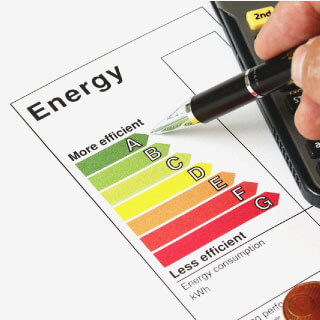Harnessing behaviour change for promoting energy efficiency

Human behavior has a critical role to play in fostering additional energy savings. Decisions related to energy use, including indoor temperature settings, adoption of star-labelled appliances, or participation in demand-response programs, are all intricately linked with human behavior. The actions and attitudes of individuals play a key role in cumulative energy consumption. Humans are the centre of energy efficiency action and barriers preventing the adoption of energy-efficient practices are not always technical, but also tend to have a strong sociological and behavioural underpinning.

Isn’t creating greater awareness enough to change behaviour?
Dissemination of relevant information and facts about the benefits of energy saving prompts individuals to take responsible action. Energy labels, smart meters and real-time electricity mechanisms enhance the awareness levels of consumers. Information policies provide a fuller picture of the economic as well as environmental consequences of people’s choices and actions. Information provision as an intervention strategy thus has strong potential to elicit energy savings. However, from a behavioural perspective, lack of information is often not the sole factor that drives over-consumption of energy. Consequently, information dissemination should not be considered the singular behavioural strategy to drive energy efficiency.

Despite best intentions, consumers largely fail to undertake the actions required for energy conservation. This gap between people’s self-professed intentions and their observed actions, famously termed as the ‘value-action gap,’ can be explained by insights from behavioral research. Several cognitive biases and motivational factors explain why consumer behavior often fails to align with people’s inherent motivations or self-interest. It provides insights into why user awareness alone proves to be an ineffective measure for behavior change.
To be able to design effective behavioral interventions, it is important to identify how behaviors are formed and how they can be influenced through various levers. People’s conscious and unconscious decisions are influenced by a number of cognitive biases that make them act in a predictably irrational manner. These biases have important implications for the design of policies to influence consumer behavior. Insights from behavior economics and social sciences are therefore of critical importance for designing behavioral strategies.
But energy efficiency is economical – shouldn’t that be incentive enough?
Energy use units such as kW or kWh are perhaps too abstract and technical and hence, overlooked in the decision-making process. In general, energy use has low visibility and considered an obscure concept. Given the complexity of energy consumption figures as well as the routine nature of its processes, the extent to which it can be expected out of individuals to consciously optimize their energy use is constrained. Right at the outset, energy consumption is generally automatic and of low personal preference for the users.
If the monetary benefits are presented in a complex manner, it adds to the cognitive burden of the consumers. In addition, a pertinent question is that are human actions always motivated by monetary incentives or do we need to search beyond the economic fulcrums for change?
Is there an example that demonstrates successful use of a cognitive bias to steer consumer behaviour?
The most successful example of leveraging behavioural insights for steering consumer behaviour lies in Home Energy Reports (HERs).
HERs motivate change by leveraging the insights from behavioral science on the power of social norms.
 Image 1: Typical design of a Home Energy Report
Image 1: Typical design of a Home Energy Report
Source: Oracle.com
One of the findings of behavioural research tells us that how we behave is very strongly guided by the behaviour and actions of those around us. How people feel they compare with their peers is a strong determinant of their feelings and activities. Building on this behavioural insight, most HERs characterize the energy usage of a home relative to homes that share their approximate size and location.
A comparison with the average power use in such homes provides an indication to a customer of its own standing in energy usage terms. HERs also highlight the energy use in the best performing homes to set a realistic and achievable goal to consumers. In addition to fine-grained information and goal-setting, a vital element in the HERs is the actionable advice and tips that provide guidance on how customers can start catching up with their more efficient peers.
How does the advent of smart technologies support behaviour change?
Smartphone applications and smart home assistants such as Alexa or Google Assistant opens up a world of possibilities to nudge consumers to smartly use their appliances.
 Image 2: Smart home products prompt behaviour change
Image 2: Smart home products prompt behaviour change
Source: Uplight.com
Technological innovation opens up a plethora of opportunities to deploy behavioural intervention – maintaining an ideal AC temperature, using dishwashers or washing machines at off-peak hours while you are out of your house, scheduling your coffee machine to turn on and off at the same time every morning or automatic turning down of inactive appliances. Smart technologies can track users’ routine and lifestyle to suggest ways to optimize energy use.
In conclusion, individuals’ choices and behavior are a vital factor to consider while leveraging different policy tools for fostering sustainable and efficient energy consumption in the residential and commercial sector. Acknowledging this, AEEE is actively working in this space to explore deployment of behavioural interventions in reducing space cooling energy demand and for facilitating the implementation of India Cooling Action Plan, which provides a 20-year and provides recommendations to provide sustainable cooling.
Some useful resources to learn more about behavioural science:
- The Behavioural Insights Team
- Behavioural Economist
- How behavioural science can lower your electricity bill
This blog is written by Simrat Kaur with inputs from Sandeep Kachhawa
Simrat is a Research Associate in the Buildings and Communities vertical of AEEE. Her research interest lies in economics of energy efficiency and behavioural energy efficiency. She holds a Masters degree in Environmental Economics and Climate Change from the London School of Economics and Political Science.




